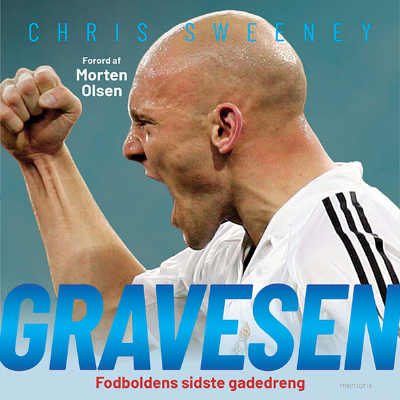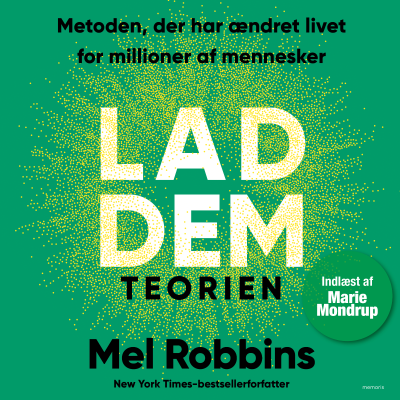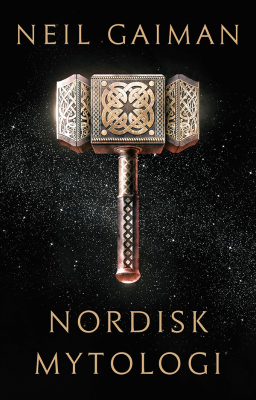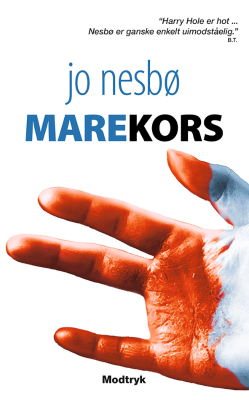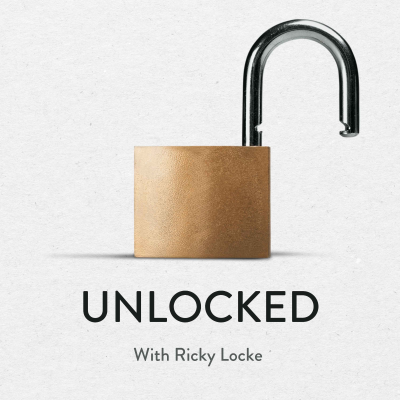
Unlocked
engelsk
Videnskab & teknologi
Begrænset tilbud
2 måneder kun 19 kr.
Derefter 99 kr. / månedOpsig når som helst.
- 20 lydbogstimer pr. måned
- Podcasts kun på Podimo
- Gratis podcasts
Læs mere Unlocked
Life is pretty tough, and we're all just trying to get through as best we can, so what if there was a weekly resource that was fun and informative that could help us get through life's obstacles and opportunities? Welcome to The UNLOCKED podcast, the weekly podcast where I share conversations with thought leaders, authors, entrepreneurs and other inspiring people to help you UNLOCK the best version of yourself and tackle life's obstacles and opportunities. If you're new here, I'm Ricky Locke, a Confidence Coach, Professional Speaker and award-winning magician (oh and a new father too!) Whether you are feeling stuck in life, need to improve your confidence or just looking to get through that next part of life and tackle your most recent obstacle, this is the podcast for you. Ready to get unlocked and live the best version of yourself? Hit that subscribe button and join me every Wednesday for a brand-new episode!
Alle episoder
116 episoder115. How to Use AI as Your Ultimate Competitive Edge with Earl Waud | How to use AI
115. HOW TO USE AI AS YOUR ULTIMATE COMPETITIVE EDGE WITH EARL WAUD | HOW TO USE AI In this episode, Ricky Locke sits down with AI educator, author, speaker and “Hindsight Mentor” Earl Waud to explore how artificial intelligence can help you think bigger, act faster and transform your life and business. If you’ve ever wondered: “Is AI going to take my job?” “Will it make me less human?” “How do I actually use this stuff without feeling overwhelmed?” ...then this episode is for you. Earl shares how a near-death experience reshaped his mission, how he became a bestselling author using AI, and how he now teaches entrepreneurs, speakers and creators to use AI as a superpower rather than a threat. Together, we dive deep into: * What AI really is (in simple terms) * How to stay ahead in the new AI-powered world * The skills that will matter most in the next 5 years * Why people who use AI will replace those who don’t * How to keep your voice, authenticity, and humanity while using AI * The four pillars Earl teaches to help people gain their ultimate competitive edge * Whether AI will replace creative jobs (editors, designers, writers) * How to use AI daily in practical, stress-free ways * Earl’s favourite tools, prompts and productivity tricks * How AI can help you write books, create content and build your brand faster * The truth about deepfakes, fake news, and the future of trust * Why curiosity, courage and communication still matter more than ever This episode will shift the way you think about AI, from something to fear, to something that can unlock your potential and elevate your success. KEY TAKEAWAYS * AI doesn’t replace humans, it replaces people who don’t use it. * Your competitive edge will be your ability to prompt, adapt and apply AI. * Authenticity isn’t lost with AI, it’s amplified when you train it in your voice. * You are one tool, one prompt, one skill away from transforming your business. * The future belongs to the curious, not the fearful. Patreon thanks! Shout out to the amazing Patron supporters for keeping this podcast going; thank you Ant Howe, Jasmine Barnes, Chloe Wilmot, Sara Kay, Cheri Brenton, Steve McDermott, Chris Lovett & Rory Barnes! You are all amazing! Come Join the UNLOCKED community where you can receive... * Early access to episodes * Patron shout outs and recognition at the end of every episode * Exclusive backstage content and bonus episodes * Ask me anything - have your questions answered online * Shape the future of the podcast with your requests. * (Optional - become a sponsor of the show!) * Exclusive giveaways and HUGE Discounts off my online courses and so much more... To be a Patron and support the podcast just head to this link [https://www.patreon.com/theunlockedpodcast] or head to https://www.patreon.com/theunlockedpodcast I can't wait for you to be a part of this journey! Free Resources * FREE Ebook 10 SIMPLE STEPS TO SELL WITH CONFIDENCE [https://mailchi.mp/0d35be4cdc01/8hyymfp0m6] * FREE Ebook 10 tips to improve your productivity [https://mailchi.mp/fecf67ff6878/10-tips-to-improve-your-productivity] * Free Workbook : Understanding Your Values [https://drive.google.com/file/d/18hahQ2osX2InxaPGkhJ9gd0MgjeQEMIr/view?usp=sharing] * FREE EBOOK : Improve your confidence and create awesome videos with a smartphone [https://www.rickylocke.co.uk/ebook] * Follow me on Instagram [https://www.instagram.com/rickylockemagic/?hl=en] & Facebook [https://www.facebook.com/RickyLockeMagic] at: @rickylockemagic [https://www.instagram.com/rickylockemagic/?hl=en] * For more about me and what I do, check out my website [https://www.rickylocke.co.uk/] PODCAST MERCHANDISE!!! It's officially here! Woohoo! You can now buy your own UNLOCKED podcast notebook. The perfect addition to share your thoughts, ideas, and inspiration from the podcast. Available here! [https://www.amazon.co.uk/UNLOCKED-Ricky-Locke-Podcast-Notebook/dp/B08TK4MQX1/ref=sr_1_1?dchild=1&keywords=ricky+locke&qid=1612290641&sr=8-1] A new episode is out every Wednesday. So make sure you hit SUBSCRIBE so you don’t miss out on any episodes coming soon. And, if this episode brought some value to you, or even a smile, then please leave a review or a rating. That would be amazing! Thanks for listening, I hope you enjoy this episode and I'll join you next week for another episode of UNLOCKED!
114. 5 Ways to Use Humor to Connect at Work with 7× Emmy Winner Beth Sherman | How to use humour in presentations
114. 5 WAYS TO USE HUMOR TO CONNECT AT WORK WITH 7× EMMY WINNER BETH SHERMAN | HOW TO USE HUMOUR IN PRESENTATIONS In this episode, comedy writer and humour strategist Beth Sherman, a seven-time Emmy Award winner known for her work on The Ellen DeGeneres Show, Letterman, and The Tonight Show shares how humour can transform communication in professional and personal settings. We explore how to use humour not to entertain, but to connect, build trust, and communicate with impact. Beth explains why “truth is funny,” how to find your authentic comedic voice, and the importance of reading the room. She also breaks down what makes humour inclusive, how to balance professionalism with playfulness, and why humour truly is a love language. Together, we discuss practical ways to use humour as a communication tool, from leadership to public speaking and how anyone (even non-comedians) can develop a more relatable, engaging style at work. Chapters 00:00 The Power of Humour in Professional Settings 04:40 Beth Sherman's Journey to Comedy Writing 08:03 Inside the Writer's Room: Collaboration and Competition 12:03 The Pressure of Deadlines in Comedy Writing 17:09 Finding Humour in Truth and Specificity 24:49 Using Humour as a Love Language in Communication 29:52 The Power of Acknowledgment in Communication 34:19 Choosing the Right Humor for Professional Settings 38:02 Using Humor as a Tool for Connection 41:22 Finding the Balance: How Much Humor is Too Much? 44:15 Quickfire Humour Tips and Misconceptions About Comedians Key Takeaways takeaways * Humor should be used to connect with others. * The best humour reflects truth and authenticity. * In a writer's room, collaboration is key to success. * Deadlines can foster creativity in comedy writing. * Self-awareness enhances the effectiveness of humor. * Humor can diffuse tension in professional settings. * Truth is the foundation of effective storytelling. * Humor is seasoning; it should complement the main message. * Understanding your audience is crucial for humor. * Using humour can demonstrate resilience and approachability. Patreon thanks! Shout out to the amazing Patron supporters for keeping this podcast going; thank you Ant Howe, Jasmine Barnes, Chloe Wilmot, Sara Kay, Cheri Brenton, Steve McDermott, Chris Lovett & Rory Barnes! You are all amazing! Come Join the UNLOCKED community where you can receive... * Early access to episodes * Patron shout outs and recognition at the end of every episode * Exclusive backstage content and bonus episodes * Ask me anything - have your questions answered online * Shape the future of the podcast with your requests. * (Optional - become a sponsor of the show!) * Exclusive giveaways and HUGE Discounts off my online courses and so much more... To be a Patron and support the podcast just head to this link [https://www.patreon.com/theunlockedpodcast] or head to https://www.patreon.com/theunlockedpodcast I can't wait for you to be a part of this journey! Free Resources * FREE Ebook 10 SIMPLE STEPS TO SELL WITH CONFIDENCE [https://mailchi.mp/0d35be4cdc01/8hyymfp0m6] * FREE Ebook 10 tips to improve your productivity [https://mailchi.mp/fecf67ff6878/10-tips-to-improve-your-productivity] * Free Workbook : Understanding Your Values [https://drive.google.com/file/d/18hahQ2osX2InxaPGkhJ9gd0MgjeQEMIr/view?usp=sharing] * FREE EBOOK : Improve your confidence and create awesome videos with a smartphone [https://www.rickylocke.co.uk/ebook] * Follow me on Instagram [https://www.instagram.com/rickylockemagic/?hl=en] & Facebook [https://www.facebook.com/RickyLockeMagic] at: @rickylockemagic [https://www.instagram.com/rickylockemagic/?hl=en] * For more about me and what I do, check out my website [https://www.rickylocke.co.uk/] PODCAST MERCHANDISE!!! It's officially here! Woohoo! You can now buy your own UNLOCKED podcast notebook. The perfect addition to share your thoughts, ideas, and inspiration from the podcast. Available here! [https://www.amazon.co.uk/UNLOCKED-Ricky-Locke-Podcast-Notebook/dp/B08TK4MQX1/ref=sr_1_1?dchild=1&keywords=ricky+locke&qid=1612290641&sr=8-1] A new episode is out every Wednesday. So make sure you hit SUBSCRIBE so you don’t miss out on any episodes coming soon. And, if this episode brought some value to you, or even a smile, then please leave a review or a rating. That would be amazing! Thanks for listening, I hope you enjoy this episode and I'll join you next week for another episode of UNLOCKED! TRANSCRIPT
113. 10 Tips to Build a Thriving Business with Faye Cornhill | Challenge Your Beliefs & Unlock Success
113. 10 TIPS TO BUILD A THRIVING BUSINESS WITH FAYE CORNHILL | CHALLENGE YOUR BELIEFS & UNLOCK SUCCESS In this episode, Faye Cornhill shares powerful tips to help you grow with confidence, attract high-paying clients, and challenge the beliefs that may be holding you back. Whether you're a solopreneur, wedding business owner, or creative entrepreneur, these mindset shifts and business strategies will help you overcome fear, redefine success, and take your business to the next level. Don't let self-doubt stop you—embrace your potential and start thriving today! Connect with Faye at: www.fayecornhillcoaching.co.uk www.theweddingbusinessclub.com www.livesinfocus.org.uk Chapters 00:00 Introduction and the Power of Belief 03:01 The Catalyst for Change 09:12 Early Entrepreneurial Spirit 15:19 Support and Belief 18:32 Challenging Societal Norms 23:21 Creating Your Own Path 27:38 The Power of Beliefs 29:33 Embracing the Temporary 30:28 Breaking Free from Societal Expectations 36:12 Pushing Through Challenges 49:00 Challenging Limiting Beliefs Takeaways -Surround yourself with people who believe in you and your dreams. -Challenge societal norms and create your own path to fulfillment. -Being true to yourself and making choices that align with your values is -key to finding purpose and success. -Fulfillment can be found in both entrepreneurship and being a stay-at-home parent. -Beliefs have a significant impact on our lives and businesses. It's important to choose empowering beliefs that support our growth and success. -The belief that everything is temporary can help us navigate both the good and the bad times. It reminds us to keep striving during the good times and to persevere through the difficult times. -Societal expectations should not dictate our choices. We have the power to choose our own path and pursue our goals and dreams, even if they go against societal norms. -Pushing through tough times and challenges can lead to personal growth and a sense of accomplishment. We are capable of more than we often give ourselves credit for. -It's important to challenge our limiting beliefs and question who is telling us that we can't achieve something. By taking action and saying 'yes' to our aspirations, we can overcome self-doubt and achieve great things. Patreon thanks! Shout out to the amazing Patron supporters for keeping this podcast going; thank you Ant Howe, Jasmine Barnes, Chloe Wilmot, Sara Kay, Cheri Brenton, Steve McDermott, Chris Lovett & Rory Barnes! You are all amazing! Come Join the UNLOCKED community where you can receive... * Early access to episodes * Patron shout outs and recognition at the end of every episode * Exclusive backstage content and bonus episodes * Ask me anything - have your questions answered online * Shape the future of the podcast with your requests. * (Optional - become a sponsor of the show!) * Exclusive giveaways and HUGE Discounts off my online courses and so much more... To be a Patron and support the podcast just head to this link [https://www.patreon.com/theunlockedpodcast] or head to https://www.patreon.com/theunlockedpodcast I can't wait for you to be a part of this journey! Free Resources * FREE Ebook 10 SIMPLE STEPS TO SELL WITH CONFIDENCE [https://mailchi.mp/0d35be4cdc01/8hyymfp0m6] * FREE Ebook 10 tips to improve your productivity [https://mailchi.mp/fecf67ff6878/10-tips-to-improve-your-productivity] * Free Workbook : Understanding Your Values [https://drive.google.com/file/d/18hahQ2osX2InxaPGkhJ9gd0MgjeQEMIr/view?usp=sharing] * FREE EBOOK : Improve your confidence and create awesome videos with a smartphone [https://www.rickylocke.co.uk/ebook] * Follow me on Instagram [https://www.instagram.com/rickylockemagic/?hl=en] & Facebook [https://www.facebook.com/RickyLockeMagic] at: @rickylockemagic [https://www.instagram.com/rickylockemagic/?hl=en] * For more about me and what I do, check out my website [https://www.rickylocke.co.uk/] PODCAST MERCHANDISE!!! It's officially here! Woohoo! You can now buy your own UNLOCKED podcast notebook. The perfect addition to share your thoughts, ideas, and inspiration from the podcast. Available here! [https://www.amazon.co.uk/UNLOCKED-Ricky-Locke-Podcast-Notebook/dp/B08TK4MQX1/ref=sr_1_1?dchild=1&keywords=ricky+locke&qid=1612290641&sr=8-1] A new episode is out every Wednesday. So make sure you hit SUBSCRIBE so you don’t miss out on any episodes coming soon. And, if this episode brought some value to you, or even a smile, then please leave a review or a rating. That would be amazing! Thanks for listening, I hope you enjoy this episode and I'll join you next week for another episode of UNLOCKED! Ricky (00:00.098) When you feel low emotionally and physically, that is when you are most susceptible to believing things that you don't believe are true. Like you can do those things. I'm not saying you have to go and do crazy things like climb mountains or whatever, but you are capable as your beliefs will let you be. And so why not change that? Like why not instead of, yeah, but I couldn't do that. Says who? Ricky (00:43.406) Welcome to the Unlocked podcast, Faye Cornhill. How are you? I'm really well, thank you. Thank you for having me. Pleasure. Yeah, finally, after boiler attempts to get that replaced and I lost my voice, I think it was on the other time, wasn't it? I had no voice, couldn't do the recording. So we're finally here now after years of talking about this. So this is an absolute pleasure, Faye. There'll be a lot of listeners that listen to my podcast that will recognise you. But for those who don't know who you are, Faye, tell us who are you? Do you know what? When people introduce themselves as really slick, like one -liner, I think, they've got it down. So for anyone listening, I don't have that down. So prepare for the waffle. I am a business coach. So I help people grow and scale their businesses. A very, very quick potted history is that 15 years ago, I started my first business, which was my wedding photography business. I just plucked the idea. literally out of thin air and started a business and it kind of went quite well. It went really well in fact and that sort of unbeknown to me grew into something that enabled me to help and support other people to do the same. I now run four different businesses all kind of with roots in the wedding industry. I am mum to two teenagers, can't believe that. Where did the time go? I live in the countryside, I have two dogs and I quite like watching films and chilling on my sofa. That's nice, that's nice, that's not waffle at all, that's lovely. Yeah, that's very good. Well, I'll you, I'm really interested to get you on here because for a multiple of reasons really. Obviously we've known each other for about four years now, I think, through the wedding business club and through... Online shows, remember those days? Wow. When we were in lockdown, they were good. That was good that and obviously the BBC as well. So one of the things that I'm really eager to talk about is your journey. And particularly on this podcast, we talked to like amazing individuals of how they've got to where they've got to start to unlock that or unpick that and understand what it takes for someone to get to just extraordinary, awesome things. And I'm genuinely intrigued about your journey, because I think it will be a similar pathway to me one day. You know, some of the thoughts and feelings that I'm having right now about Ricky (03:01.324) children and how that can massively throw off your plans and your dreams, but also still in, you know, we still got to keep it on track. Right. So I'm genuinely really interested about this. Go back to early days. You obviously have had a wonderful career through you can us a little bit about, you know, obviously full time employment and obviously creating a bit. So let's talk a little bit about your story from being young. Was it a dream or did you aspire to go into photography? Never photography. No, I was. I always, always had this feeling that I would have my own business. And I don't really know where that came from because I don't come from a family of entrepreneurs. know, a lot of people say, I learned what I know from my dad or from my mom or from my grandma, but actually nobody in my family was self -employed. In fact, quite the opposite, I would say. I come from an upbringing of actually really hardworking people. all who worked hard for somebody else. And I think that is inspirational in itself. My dad worked for his whole life for Clark Shoes. My dad was an engineer. He was also a part -time fireman. And he worked, yeah, making the tools that make shoes that are on our school kids' feet. And he worked for them for years. And I have to say, I think I found that in equal parts. inspirational, like someone can stick doing the same thing for that long. And also inspirational not to actually repeat that because I get bored really easily and the idea of going to the same place of work every day. mean, my dad would have started there, I guess when he was like 16 when he left school and left at retirement age, the thought of that kills me actually. I don't think I've thought what it takes to do that. So I wasn't, I haven't been brought up to run businesses in my sleep, but I was always really curious about the idea. I remember as a kid, I would sell stuff in the playground, like not bad stuff. I went to a nice little village primary. Dodgy DVDs and stuff like that and videos. actually the first thing I ever sold was headed letter paper. And so we bought a computer. Ricky (05:25.366) which was a big, big deal for our family. I mean, it couldn't do anything apart from like write a document and print it. And even that was quite bad. And it had clip art. And I would sell to my friends, like, do you want a dolphin or would you like a butterfly? And I would write their name and I would print them letterhead. And then they could write their thank you letters for their Christmas gifts on fancy letterhead paper. And so I made some cash from that, which was fun because... You know, I didn't pay for the ink or paper. Nice. was good. was good. overheads then. I've always been deeply curious about making money. And I don't think it comes from a place of materialism. I've honestly never really been materialistic. I wasn't as a kid. I'm not now. I say I'm less now than I ever have been. But I just thought it was a really fun game. thought it was really fun. you know, what I grew up in a, in a West country, like very normal place to grow up, a very normal upbringing where people worked hard for their money and you went on your week holiday in the summer. And I always found that really interesting, like how life works and how money works. Interesting. I'm quite particularly interested in this, like, cause again, similar thing, you know, I mean, one of my earliest business. ventures was to give Christmas cards to all my paper round, know, come up with the idea of my brother of like, you know, if we like, you know, really give a great customer experience, good service, you know, we're nice with friendly people, you know, and we give them all little Christmas cards, we'd have this little competition where we get who get the most tips, you know, and being very young, you know, it's a great little venture, right. But I'm always intrigued to understand like, where does this come from? You've mentioned that there was no one in your family that bone, you know, even the same with me, you know, no one. I don't even have anyone I think in the couple of generations who kind of create their own business. I'm the first person that creates my business. So it's interesting. Do you think that a lot of that is because of the conditions of the environment that we're part of? Was there any friends or family members, not close family members that might have influenced you with that? Or do you think it was just something you were born with? I think I learned very quickly that I could influence people by what I said. And so very early on I was at drama school. Ricky (07:47.93) I was in plays and shows and at Christmas I'd be embarrassingly standing up and singing for the family. so at the same time as being really curious about money and business, I learned that I could influence people by what I said and what I did. My school reports all say like, it's very hard to be cross with Faye because she kind of makes me laugh. And I learned, I knew I was really aware of that. I could get myself into a hole as quickly as I could get myself out of the hole. And so I think it was almost like being rewarded for that particular skill that I was honing as a child. Like, you know, the saying, the gift of the gab, that's what my grandparents and my parents would have said about me at a young age. And I just, I just enjoy conversations. I enjoy speaking to people. You know, I worked in... corporate world for long enough to know that I didn't want to work in it any longer. But I still got that rush and that thrill of like, I've worked really hard for this relationship. This person is on my side. And what I say to them now will dictate the result in my paycheck. And like it or not, that's how it works. And it worked in my favor most of the time. It's like you were very early on then learning the art of rapport and getting people to feel connected with you, which is obviously, I mean, from where you are right now, right? You've got this massive following. You've got this massive community which people feel connected. And I felt that before, you know, when we've had conversation before, there's something that's magnetic, you like you feel, I feel like Faye's known me for a long time, but actually it's the first or second conversation we've had. So yeah, so that's really good then. So that's great. So that's just come out of then from being young. So obviously life gets in the way, right? So I know that obviously you then obviously go into A levels, I believe. Yeah. So studied my A levels in my hometown, still living at home and really loved that. You know, I did drama A level, but I also did psychology A level and that was really, I felt like I, it sort of solidified what I'd started to believe about humans and interaction and how we. Ricky (10:08.514) deal with each other. And I found that really interesting. And of course, at the same time as, you know, being on a stage and, you know, anything from Shakespeare to like street comedy. So all of those things sort of came together for me. And I really enjoyed that period of my life, actually. I enjoyed studying for my A levels. I had that sense of, you know, I'm going to be the first in my family to go to university, which I always knew that I wanted to do. And I went off and I studied cultural and media studies because I wanted to make documentaries. That's what I wanted to do. I decided at that stage, I don't want to be on the stage just too much for me, but I really want to be a documentary maker. And that's what I'd studied for basically three years at university and had the best time. Brilliant, So curious then here. So obviously from an early age here, you've got this wonderful desire to make money. really interested in this. You got this entrepreneurial skills or these entrepreneurial DNA genes, whatever you want to call it, right? Which is not coming from family, right? It's just there, right? And then you go into a career where I guess is not entrepreneurial, but you're going to move up the ladder and you go quite high up in this corporate role. You then obviously go through this period where you're then going to go, you obviously have children and then something changes along that way where you then obviously start to then create your own business again. So tell me a little bit about this period between where You're in a corporate job, which we've all been there. I know we've had the same similar experience. Tell me about your experience of this corporate environment and then what led you to then eventually creating going off going, hey, you know what? I don't want to this anymore. I want to be my own boss. I want to create my own business. Tell me about that. Well, I knew from day one that the corporate dream as it were was my second choice. I graduated from university and I got offered my dream job at the BBC, like, my gosh, this is the one, like, amazing, this is gonna be great. But the money was appalling. The money did not cover the train ticket to get into London. And I had to make this really horrible, difficult decision where I felt basically I'm giving up on this thing that I want to do because I'm ambitious and I don't want to live like a pauper at. Ricky (12:28.846) to say that I got the dream job. And the two things were just not going together for me. So I had to say no to the job, the 11 grand offer. My train ticket context would have been 12 grand. Great. And so I took the first job that came my way, which was a sales job. I worked for a Japanese tech company. I don't speak Japanese. And yeah, took this. highly technical sales job, the only woman at the time that worked there. And I just remember this like, okay, well, this is it then, isn't it? Because I've done my little fun thing of like dreaming of doing fun stuff and like making documentaries. But now like, this is where I have to make the money and I want to make the money. And it was a great offer. It was a great, great salary, brilliant career prospects. And I thought, well, you know, this is just how it goes. And that is how it went for a bit. like, I can't say that I hated it. You you hear these stories of people hating their corporate job or hating the career that they chose. I really didn't. I didn't. It taught me so much about running a business, dealing with people, dealing with people that you really don't like or want to work with, dealing with sexism in the workplace, especially in that first role. And for a while I just sort of kind of went through the corporate mill as it were. The point where everything changed was when I had Harry. So Harry's 15 now. And I remember distinctly the Sunday before having to go back on the Monday, so he was nine months old, I'd taken my nine months statutory maternity pay. And at the time we lived in a town called Amersham, near where I live now....
112 How to Improve your sleep with Ryan Snell of Unstoppabl | The key to high performance
112 HOW TO IMPROVE YOUR SLEEP WITH RYAN SNELL OF UNSTOPPABL | THE KEY TO HIGH PERFORMANCE In this week's episode I am joined with Ryan Snell of Unstoppabl and we dive into the critical role of sleep in enhancing high performance, discussing the alarming statistics of sleep deprivation and its economic impact. Exploring the health risks associated with insufficient sleep, including its effects on decision-making, productivity, and overall well-being. We discuss the importance of understanding sleep's functions and the significance of maintaining a healthy circadian rhythm to optimise sleep quality and health. We also discuss the challenges of modern life and how they impact our sleep and overall well-being and how to align with our natural circadian rhythms, offering practical strategies to improve sleep quality. Find out more about Ryan at https://unstoppabl.com/about-unstoppabl Chapters 00:00The Importance of Sleep in High Performance 02:55 Sleep Deprivation and Its Economic Impact 06:07 Health Risks Associated with Lack of Sleep 08:53 Understanding Sleep and Its Functions 11:55 The Role of Circadian Rhythm in Sleep Quality 15:03 Navigating Modern Life's Challenges 16:28 Understanding Circadian Rhythms 18:39 Strategies for Aligning with Nature 20:20 Creating a Sleep-Conducive Environment 22:55 Setting Boundaries for Better Sleep 25:31 Optimizing Your Sleep Space 28:41 Investing in Sleep Quality 29:15 The Impact of Caffeine on Sleep 30:52 Parenting and Sleep Challenges 34:04 Mental Health and Sleep 35:18 Practical Sleep Tips for Parents 39:02 Taking Responsibility for Sleep Improvement takeaways * One in five people are not getting enough sleep. * Sleep deprivation costs the UK economy around 40 billion pounds annually. * Lack of sleep can lead to poor decision-making and productivity loss. * Individuals getting less than six hours of sleep lose about six working days a year. * Sleep is crucial for recovery and overall health. * Arianna Huffington's experience highlights the dangers of sleep deprivation. * Circadian rhythm plays a vital role in sleep quality. * Sleep debt cannot be recovered; it accumulates over time. * Prioritizing sleep is essential for personal and professional success. * Healthy sleep habits are foundational for long-term health. We need to switch off from constant attention demands. * Modern life challenges our natural rhythms. * Aligning with circadian rhythms can improve sleep. * Morning sunlight exposure is crucial for alertness. * Creating a sleep-conducive environment is essential. * Setting boundaries helps improve sleep quality. * Avoid screens for at least 30 minutes after waking. * A cool, dark, and quiet bedroom promotes better sleep. * Regularly assess and update your mattress for comfort. * Simple strategies can lead to significant improvements in sleep. Investing in a good mattress is crucial for sleep quality. * Caffeine can significantly impact sleep; a cutoff time is recommended. * Parents should maintain a consistent wake-up time regardless of sleep quality. * Napping can help offset sleep deprivation, especially for parents. * Mental health is closely linked to sleep quality; lack of sleep increases anxiety and depression risk. * Setting boundaries around work and technology use is essential for better sleep. * Morning sunlight exposure can help regulate circadian rhythms. * Creating a calming bedtime routine can improve sleep quality. * Nutrition and hydration play a vital role in overall health and sleep. * Taking responsibility for sleep habits can lead to better health outcomes. Patreon thanks! Shout out to the amazing Patron supporters for keeping this podcast going; thank you Ant Howe, Jasmine Barnes, Chloe Wilmot, Sara Kay, Cheri Brenton, Steve McDermott, Chris Lovett & Rory Barnes! You are all amazing! Come Join the UNLOCKED community where you can receive... * Early access to episodes * Patron shout outs and recognition at the end of every episode * Exclusive backstage content and bonus episodes * Ask me anything - have your questions answered online * Shape the future of the podcast with your requests. * (Optional - become a sponsor of the show!) * Exclusive giveaways and HUGE Discounts off my online courses and so much more... To be a Patron and support the podcast just head to this link [https://www.patreon.com/theunlockedpodcast] or head to https://www.patreon.com/theunlockedpodcast I can't wait for you to be a part of this journey! Free Resources * FREE Ebook 10 SIMPLE STEPS TO SELL WITH CONFIDENCE [https://mailchi.mp/0d35be4cdc01/8hyymfp0m6] * FREE Ebook 10 tips to improve your productivity [https://mailchi.mp/fecf67ff6878/10-tips-to-improve-your-productivity] * Free Workbook : Understanding Your Values [https://drive.google.com/file/d/18hahQ2osX2InxaPGkhJ9gd0MgjeQEMIr/view?usp=sharing] * FREE EBOOK : Improve your confidence and create awesome videos with a smartphone [https://www.rickylocke.co.uk/ebook] * Follow me on Instagram [https://www.instagram.com/rickylockemagic/?hl=en] & Facebook [https://www.facebook.com/RickyLockeMagic] at: @rickylockemagic [https://www.instagram.com/rickylockemagic/?hl=en] * For more about me and what I do, check out my website [https://www.rickylocke.co.uk/] PODCAST MERCHANDISE!!! It's officially here! Woohoo! You can now buy your own UNLOCKED podcast notebook. The perfect addition to share your thoughts, ideas, and inspiration from the podcast. Available here! [https://www.amazon.co.uk/UNLOCKED-Ricky-Locke-Podcast-Notebook/dp/B08TK4MQX1/ref=sr_1_1?dchild=1&keywords=ricky+locke&qid=1612290641&sr=8-1] A new episode is out every Wednesday. So make sure you hit SUBSCRIBE so you don’t miss out on any episodes coming soon. And, if this episode brought some value to you, or even a smile, then please leave a review or a rating. That would be amazing! Thanks for listening, I hope you enjoy this episode and I'll join you next week for another episode of UNLOCKED!
111 How to become an olympian and The Link Between Mental Health and Performance with Leon Taylor | Best self improvement podcasts
111 HOW TO BECOME AN OLYMPIAN AND THE LINK BETWEEN MENTAL HEALTH AND PERFORMANCE WITH LEON TAYLOR | BEST SELF IMPROVEMENT PODCASTS In this conversation, Leon Taylor shares his journey from a challenging childhood to becoming an Olympic diver. He discusses the importance of pursuing meaningful goals, the challenges of maintaining motivation, and the significance of commitment over fleeting motivation. Leon emphasizes the mental state required for high-performance diving and the balance between individual and team dynamics in synchronized diving. He also reflects on the importance of identity beyond sports and the impact of external pressures on mental health. In this conversation, the speakers delve into the complexities of mental health, particularly in the context of competitive sports. They discuss personal experiences with mental health challenges, the evolution of diving codes, and the importance of physical movement for mental well-being. The dialogue emphasizes the need for athletes to prioritize their mental health and the significance of savoring moments in life. The speakers also reflect on the legacy they hope to leave for future generations, encouraging a balanced approach to performance and fulfillment. Connect with Leon Taylor at https://leontaylor.co.uk/ Chapters 00:00 The Pursuit of Meaningful Goals 01:57 Journey to Becoming an Olympian 10:38 The Challenge of Consistent Motivation 11:40 The Importance of Commitment Over Motivation 15:58 Mental State on the Diving Board 23:50 The Balance of Individual and Team Dynamics 28:39 Navigating Mental Health Challenges 30:55 The Evolution of Diving Codes 35:02 Breaking Barriers in Competitive Diving 36:42 The Link Between Mental Health and Performance 40:23 The Importance of Physical Movement for Mental Health 46:30 Finding Ease in a Fast-Paced World 51:10 Leaving a Legacy for Future Generations Takeaways -Give people the chance to not give themselves a hard time. -The pursuit of goals can sometimes feel meaningless. -Physical activity started early in life for me. -I didn't know the Olympics existed until I saw them on TV. -Training for the Olympics requires immense dedication and sacrifice. -Motivation can be fickle; commitment is more reliable. -The environment you train in shapes your performance. -Mental state is crucial when performing under pressure. -It's important to evaluate performance without catastrophizing. -Your identity should not solely be tied to your sport. Navigating mental health requires honesty and communication. -Physical movement significantly impacts mental health. -The evolution of diving codes opened new opportunities. -Breaking barriers in sports can change perceptions. -Mental health issues are common among athletes. -Savoring small moments can enhance overall well-being. -It's important to find ease in a fast-paced life. -Athletes should not solely focus on outcomes. -Legacy involves imparting wisdom to future generations. -Fulfillment comes from the journey, not just achievements. Patreon thanks! Shout out to the amazing Patron supporters for keeping this podcast going; thank you Ant Howe, Jasmine Barnes, Chloe Wilmot, Sara Kay, Cheri Brenton, Steve McDermott, Chris Lovett & Rory Barnes! You are all amazing! Come Join the UNLOCKED community where you can receive... * Early access to episodes * Patron shout outs and recognition at the end of every episode * Exclusive backstage content and bonus episodes * Ask me anything - have your questions answered online * Shape the future of the podcast with your requests. * (Optional - become a sponsor of the show!) * Exclusive giveaways and HUGE Discounts off my online courses and so much more... To be a Patron and support the podcast just head to this link [https://www.patreon.com/theunlockedpodcast] or head to https://www.patreon.com/theunlockedpodcast I can't wait for you to be a part of this journey! Free Resources * FREE Ebook 10 SIMPLE STEPS TO SELL WITH CONFIDENCE [https://mailchi.mp/0d35be4cdc01/8hyymfp0m6] * FREE Ebook 10 tips to improve your productivity [https://mailchi.mp/fecf67ff6878/10-tips-to-improve-your-productivity] * Free Workbook : Understanding Your Values [https://drive.google.com/file/d/18hahQ2osX2InxaPGkhJ9gd0MgjeQEMIr/view?usp=sharing] * FREE EBOOK : Improve your confidence and create awesome videos with a smartphone [https://www.rickylocke.co.uk/ebook] * Follow me on Instagram [https://www.instagram.com/rickylockemagic/?hl=en] & Facebook [https://www.facebook.com/RickyLockeMagic] at: @rickylockemagic [https://www.instagram.com/rickylockemagic/?hl=en] * For more about me and what I do, check out my website [https://www.rickylocke.co.uk/] PODCAST MERCHANDISE!!! It's officially here! Woohoo! You can now buy your own UNLOCKED podcast notebook. The perfect addition to share your thoughts, ideas, and inspiration from the podcast. Available here! [https://www.amazon.co.uk/UNLOCKED-Ricky-Locke-Podcast-Notebook/dp/B08TK4MQX1/ref=sr_1_1?dchild=1&keywords=ricky+locke&qid=1612290641&sr=8-1] A new episode is out every Wednesday. So make sure you hit SUBSCRIBE so you don’t miss out on any episodes coming soon. And, if this episode brought some value to you, or even a smile, then please leave a review or a rating. That would be amazing! Thanks for listening, I hope you enjoy this episode and I'll join you next week for another episode of UNLOCKED!
Vælg dit abonnement
Begrænset tilbud
Premium
20 timers lydbøger
Podcasts kun på Podimo
Gratis podcasts
Opsig når som helst
2 måneder kun 19 kr.
Derefter 99 kr. / måned
Premium Plus
100 timers lydbøger
Podcasts kun på Podimo
Gratis podcasts
Opsig når som helst
Prøv gratis i 7 dage
Derefter 129 kr. / måned
2 måneder kun 19 kr. Derefter 99 kr. / måned. Opsig når som helst.











